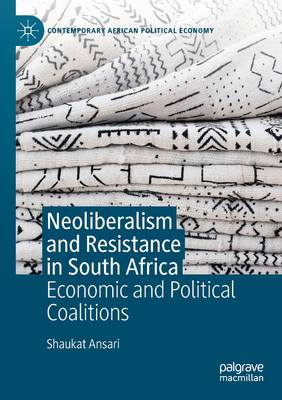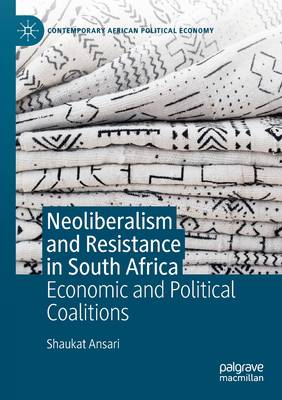
Door een staking bij bpost kan je online bestelling op dit moment iets langer onderweg zijn dan voorzien. Dringend iets nodig? Onze winkels ontvangen jou met open armen!
- Afhalen na 1 uur in een winkel met voorraad
- Gratis thuislevering in België vanaf € 30
- Ruim aanbod met 7 miljoen producten
Door een staking bij bpost kan je online bestelling op dit moment iets langer onderweg zijn dan voorzien. Dringend iets nodig? Onze winkels ontvangen jou met open armen!
- Afhalen na 1 uur in een winkel met voorraad
- Gratis thuislevering in België vanaf € 30
- Ruim aanbod met 7 miljoen producten
Zoeken
€ 105,45
+ 210 punten
Uitvoering
Omschrijving
This book critically examines the persistence of market orthodoxy in post-apartheid South Africa and the civil society resistance such policies have generated over a twenty-five-year period. Each chapter unpacks the key political coalitions and economic dynamics, domestic as well as global, that have sustained neoliberalism in the country since the transition to liberal democracy in 1994. Chapter 1 analyzes the political economy of segregation and apartheid, as well as the factors that drove the democratic reform and the African National Congress' (ANC) subsequent abandonment of redistribution in favor of neoliberal policies. Further chapters explore the causes and consequences of South Africa's integration into the global financial markets, the limitations of the post-apartheid social welfare program, the massive labour strikes and protests that have erupted throughout the country, and the role of the IMF and World Bank in policymaking. The final chapters also examine the political and economic barriers thwarting the emergence of a viable post-apartheid developmental state, the implications of monopoly capital and foreign investment for democracy and development, and the phenomenon of state capture during the Jacob Zuma Presidency.
Specificaties
Betrokkenen
- Auteur(s):
- Uitgeverij:
Inhoud
- Aantal bladzijden:
- 180
- Taal:
- Engels
- Reeks:
Eigenschappen
- Productcode (EAN):
- 9783030697686
- Verschijningsdatum:
- 4/05/2022
- Uitvoering:
- Paperback
- Formaat:
- Trade paperback (VS)
- Afmetingen:
- 148 mm x 210 mm
- Gewicht:
- 235 g

Alleen bij Standaard Boekhandel
+ 210 punten op je klantenkaart van Standaard Boekhandel
Beoordelingen
We publiceren alleen reviews die voldoen aan de voorwaarden voor reviews. Bekijk onze voorwaarden voor reviews.











